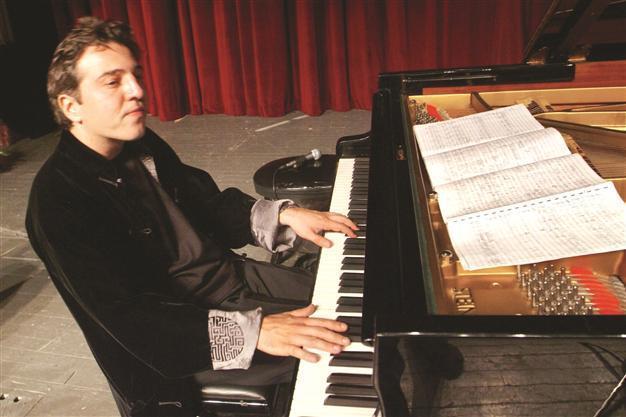Say attacks listeners of the arabesque music on Twitter
EMRAH GÜLER ANKARA - Hürriyet Daily News

Fazıl Say has been tweeted ‘Those who listen to arabesque music are traitors.’ Ferdi Tayfur, arabesque musician, says then everyone is traitor. Hürriyet photo
Fazıl Say might just be the musician with the greatest global recognition modern Turkey has seen. He is definitely one the most accomplished composers and pianists. Say wrote his first piano sonata at the age of fourteen. He has played with the New York Philharmonic and the Berlin Symphony Orchestra and been making music for nearly three decades now.
In the isolated world of classical music, Say has managed with great success to incorporate themes that are culturally relevant to Turkish culture and history. The “Nazım Oratorio,” an ode to the famous poet who spent most of his adult life in exile only to become a national treasure after his death, the “Requiem for Metin Altıok,” another poet brutally killed in 1993, “Nasreddin Hoca’s Dances for Piano,” and “Silence of Anatolia” piano concerto are some of the renowned examples.
Say also served as the ambassador of intercultural dialogue in 2008. These all give the impression of a man who is finely tuned to the dynamics of his country, who has the necessary qualities to act as a bridge between the country he represents and the global culture he became part of a long time ago. Not exactly true.
Thanks to his Twitter account, which has been shut down and reactivated one too many times, Say’s name is now in danger of becoming synonymous with provocative, insensitive messages that raise quite the brouhaha in a country where people are far too easily offended.
In fact, last month Say was on trial for inciting hatred and public enmity, and for insulting “religious values,” facing a maximum sentence of 18 months in prison. He came under investigation for a series of tweets he had sent earlier in April, declaring himself an atheist and making fun of Islam and Islamic practices. “Why such haste?” asked one of the tweets after a call to prayer that was cut short, “Have you got a mistress waiting or a rakı on the table?” (Rakı being the national alcoholic drink.)
Another tweet asked whether Islamic heaven was a tavern or a brothel, with its promises of wine and virgins, citing a verse from Omar Khayyam, the medieval Persian poet read and loved by many in Turkey. With the charges against him, coupled with death threats, Say soon made clear his intentions of leaving Turkey, and perhaps moving to Japan. Say once again used his Twitter account last week to make an off comment and stir some adrenaline-inducing controversy. He tweeted, “Those who listen to arabesque music are traitors.”
Say’s comments‘Arabesque’ music is a reflection of frustrations of those living on the peripheries of big cities, new classes that came to life after the chaotic urbanization and migration after the 1960s. It is the music of the decaying city in which poverty-stricken migrant workers are exploited and abused. It portrays a world of complex and turbulent emotions where people are doomed to solitude and hopeless futures. Say’s cutting comment is another example of the polarization between the Islamic conservative middle class and the secular urban upper-middle class, or the “white Turks” as referred to in recent popular culture. This polarization was all along a major part of modern Turkey but was never so evident until recent history with the rise of the government led by the Islamist Justice and Development Party (AKP). Among the reactions to Say’s tweet, the most significant came from Ferdi Tayfur, one of the pioneers of arabesque music in 1970s. Before getting on stage for a concert in Cologne, Tayfur said to a Doğan news agency reporter, “You need to use your fingers, not your mouth. You go play the piano. Do you call 85 percent of Turkey traitors?”
More than anything on Say’s tweet, the worst thing was about its timing when another pioneer of arabesque music, Müslüm Gürses, called Müslüm Baba by the nation out of respect, was hospitalized last week. Say was quick to send another tweet, a heartfelt message of hope for Gürses’ recovery, ending it with “Come back to life, Müslüm Baba.”
While Say’s wishes to a quick recovery seem sincere, it won’t be long before he insults arabesque music in the future again. This wasn’t the first time as back in 2010, a note on his Facebook page declared arabesque music, “a burden on enlightenment, modernity, being a pioneer and an artist,” ending it with, “I am ashamed of Turkish people’s lowlife interest in arabesque. I am ashamed. I am ashamed.”
